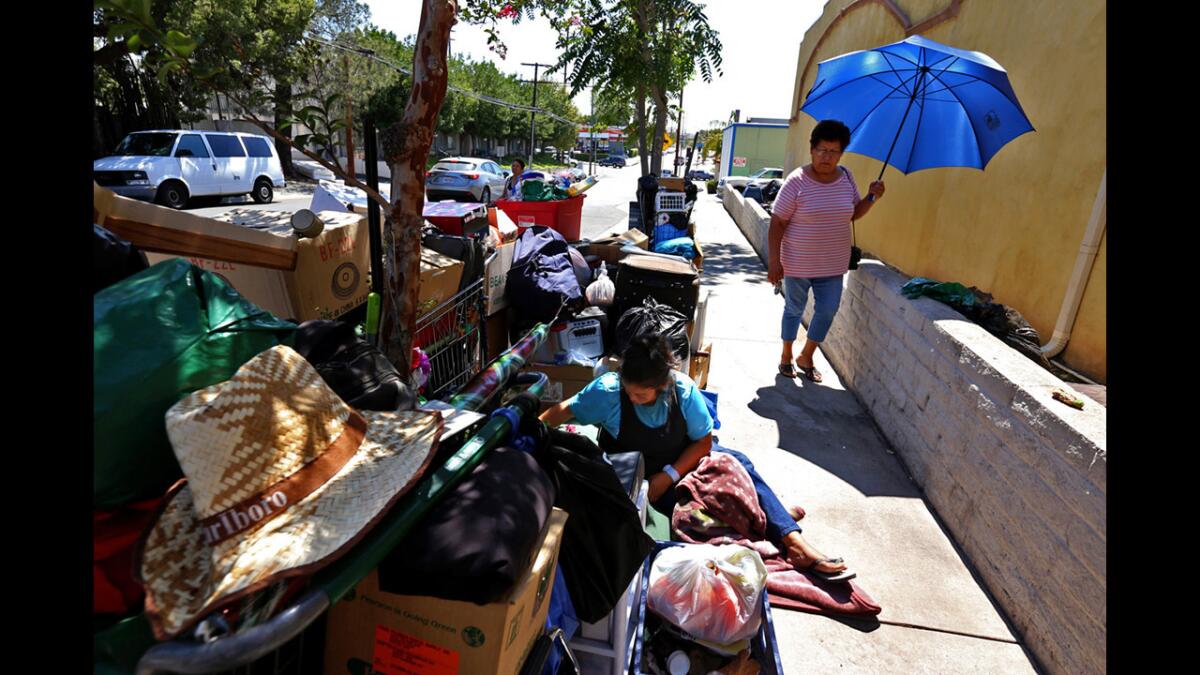Editorial: What every homeless person needs in this pandemic: a room of their own

- Share via
During the current COVID-19 pandemic, you can’t follow the order to stay at home if you have no home. Few communities are more imperiled by the coronavirus than the estimated 59,000 homeless individuals who bed down on sidewalks, in tents or in their vehicles in Los Angeles County.
As of Tuesday, 10 homeless people in the county tested positive for the virus. But the horrific possibility that more than 2,500 of them could end up hospitalized with COVID-19 (according to a study by public health experts) has sent city and county officials scrambling to bring people inside on a scale we’ve all wanted but had yet to see. In a matter of weeks, city officials have converted empty recreation centers into shelters with cots placed at a safe distance from one another. At last count, the city was providing more than 800 beds this way.
That’s been a smart approach. Even a group setting like a shelter — equipped with more hygienic facilities and with service providers watching for signs of illness — is healthier than a sidewalk, according to L.A. County public health officials.
But what homeless people really need is what the rest of us have: a room to live in, safe and separate from others. And that’s what Los Angeles County officials have been working to deliver over the last 10 days. They have sought deals with hundreds of hotels and motels — empty since the pandemic put a stake through business travel and tourism — to house the most vulnerable homeless people. Rooms would be filled with homeless people from shelters and the streets who do not have the virus now but have been identified as most at risk of serious illness if they were to get infected. So far, the county has contracted with 15 motels and hotels for more than 1,000 beds, and is in various stages of negotiations for thousands more.
The goal is to get 15,000 rooms, which Heidi Marston, the interim executive director of the Los Angeles Homeless Services Authority, says would be enough to cover those who are older, have underlying conditions and are most at risk for needing to be hospitalized if they get sick.
The effort (dubbed “Project Roomkey”) is an ambitious, speedy response to two emergencies — the pandemic and homelessness — that could merge into one disaster. If even just a few thousand homeless people move into hotel rooms in the next few weeks (along with the hundreds already in recreation center shelters), the county and the city would have sheltered homeless people at an unprecedented rate.
Still, the project needs to be implemented faster and at a larger scale to outrace the spread of the virus. As of Tuesday, only 350 people had actually moved into hotel rooms. Officials have managed to secure lodging from Lancaster to West L.A., but more owners of hotels and motels need to step up.
In downtown Los Angeles, which has some of the bigger hotels and one of the largest concentrations of homeless individuals in the city, hotel owners have been particularly reluctant to sign contracts out of concerns over the physical impact on their hotels (although all the contracts require the county to return the hotels in the conditions in which they got them). Another factor holding back hoteliers, said Phil Ansell, the county official who has been shepherding this effort, is “a little bit of concern about their reputation or image.”
That’s an unacceptable stance in this crisis. Hotel and motel owners should see it as their civic duty to open their doors to people who, without rooms, risk dying in this pandemic. They will be paid for three months to rent out their entire establishments, and will be able to keep their employees at work helping to maintain the properties. All the hotels will have service providers working on site and health professionals looking for signs that anyone is getting ill.
Perhaps hotel owners should look at the effect on their reputations this way: Wouldn’t it be better for their image if the public knew that they’d stepped up in a crisis than if they were found to have kept their rooms empty and idled their workers?
Hopefully, this offers a glimpse of what the county can do for homeless people without a raging pandemic. Perhaps some of the motel and hotel owners who have signed up to help now will consider how they can be part of the solution to homelessness after the coronavirus finally goes away.
More to Read
A cure for the common opinion
Get thought-provoking perspectives with our weekly newsletter.
You may occasionally receive promotional content from the Los Angeles Times.










